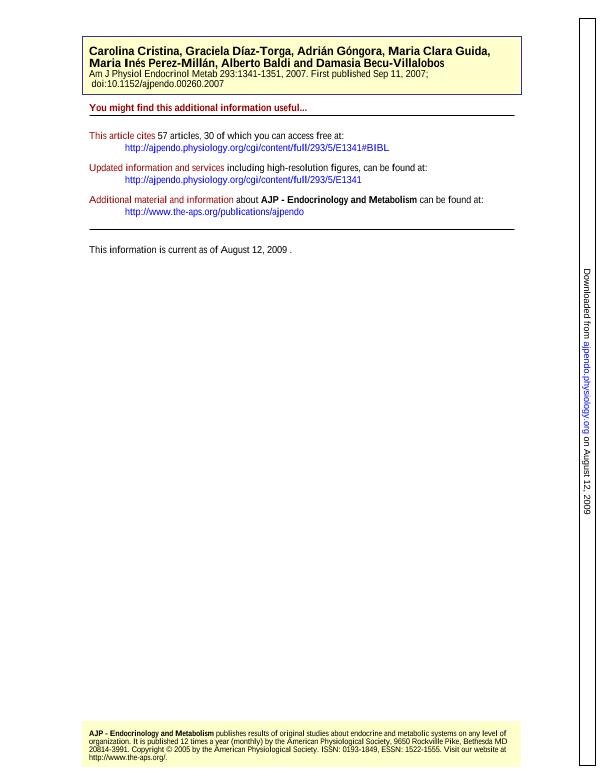Artículo
Fibroblast growth factor-2 in hyperplastic pituitaries of D2R knockout female mice
Cristina, Silvia Carolina ; Diaz, Graciela Susana
; Diaz, Graciela Susana ; Gongora, Adrian Daniel
; Gongora, Adrian Daniel ; Guida, María Clara
; Guida, María Clara ; Pérez Millán, María Inés
; Pérez Millán, María Inés ; Baldi, Alberto
; Baldi, Alberto ; Becu, Damasia
; Becu, Damasia
 ; Diaz, Graciela Susana
; Diaz, Graciela Susana ; Gongora, Adrian Daniel
; Gongora, Adrian Daniel ; Guida, María Clara
; Guida, María Clara ; Pérez Millán, María Inés
; Pérez Millán, María Inés ; Baldi, Alberto
; Baldi, Alberto ; Becu, Damasia
; Becu, Damasia
Fecha de publicación:
11/2007
Editorial:
American Physiological Society
Revista:
American Journal Of Physiology-endocrinology And Metabolism
ISSN:
0193-1849
e-ISSN:
1522-1555
Idioma:
Inglés
Tipo de recurso:
Artículo publicado
Clasificación temática:
Resumen
Dopamine D2 receptor (D2R) knockout (KO) female mice develop chronic hyperprolactinemia and pituitary hyperplasia. Our objective was to study the expression of the mitogen fibroblast growth factor (FGF2) and its receptor, FGFR1, comparatively in pituitaries from KO and wild-type (WT) female mice. We also evaluated FGF2 subcellular localization and FGF2 effects on pituitary function. FGF2-induced prolactin release showed a similar response pattern in both genotypes, even though basal and FGF2-stimulated release was higher in KO. FGF2 stimulated pituitary cellular proliferation (MTS assay and [(3)H]thymidine incorporation), with no differences between genotypes. FGF2 concentration (measured by ELISA) in whole pituitaries or cultured cells was lower in KO (P < 0.00001 and 0.00014). Immunofluorescence histochemistry showed less FGF2 in pituitaries from KO females and revealed a distinct FGF2 localization pattern between genotypes, being predominantly nuclear in KO and cytosolic in WT pituitaries. Finally, FGF2 could not be detected in the conditioned media from pituitary cultures of both genotypes. FGFR1 levels (Western blot and immunohistochemistry) were higher in pituitaries of KO. Basal concentration of phosphorylated ERKs was lower in KO cells (P = 0.018). However, when stimulated with FGF2, a significantly higher increment of ERK phosphorylation was evidenced in KO cells (P < or = 0.02). We conclude that disruption of the D2R caused an overall decrease in pituitary FGF2 levels, with an increased distribution in the nucleus, and increased FGFR1 levels. These results are important in the search for reliable prognostic indicators for patients with pituitary dopamine-resistant prolactinomas, which will make tumor-specific therapy possible.
Archivos asociados
Licencia
Identificadores
Colecciones
Articulos(IBYME)
Articulos de INST.DE BIOLOGIA Y MEDICINA EXPERIMENTAL (I)
Articulos de INST.DE BIOLOGIA Y MEDICINA EXPERIMENTAL (I)
Citación
Cristina, Silvia Carolina; Diaz, Graciela Susana; Gongora, Adrian Daniel; Guida, María Clara; Pérez Millán, María Inés; et al.; Fibroblast growth factor-2 in hyperplastic pituitaries of D2R knockout female mice; American Physiological Society; American Journal Of Physiology-endocrinology And Metabolism; 293; 5; 11-2007; E1341-E1345
Compartir
Altmétricas



